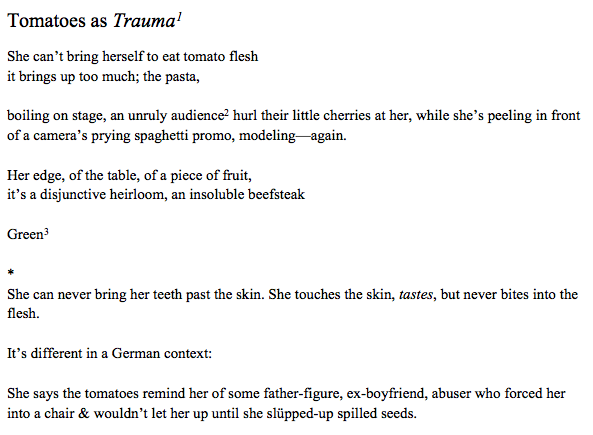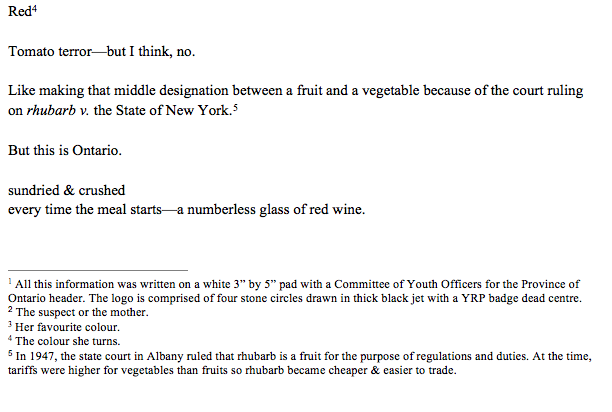TOMATOES AS TRAUMA
Joseph LaBine
PDF of this Piece // PDF of Issue 2
Next Piece


Artist Statement
Concerning discourses on sex and performance, I am primarily interested in notions of past trauma and how they inform our sexual lives. I approach Lynda Hart’s concept of “performing sadomasochism,” as outlined in Between the Body and the Flesh, and I extend her discussions of pain to psychological cues that force trauma to the surface of verbal discussions in feminist poetics, and a poem like the one above, which has multiple stories inside of it. Traumas inform our positions on pleasure and they engender shame. Traumas forcefully shape sexual identity—or are an aspect of “getting off” that partners negotiate. In this way, I examine trauma as a footnote to the event of sex. Here, traumas are stories within stories that inform events without disrupting the performance, or the act of sex itself.
In my poetry, footnotes force the reader to look down the page. If poems are people, then, for that moment when you address a footnote (which may indeed be an instance of trauma) you can’t look people in the eye. I endeavour to produce the same sense of shame or reservation survivors feel when they publicly talk about traumatic experiences. Sometimes, though, these expressions are also shameless. Trauma can make a subject more forthcoming about sex. I have looked at transcripts of first person accounts of edgeplay in Staci Newmahr’s recent Playing on the Edge: Sadomasochism, Risk, and Intimacy, and these certainly inform the poem I am putting forward. I am interested in divergent (and deviant) subject positions regarding sex, specifically, regarding tomatoes, because during my inquiries I noticed how it is possible to interrogate ideas about sex by associating these ideas with foods. The association between gustatory sense and sexual pleasure is quite apparent. But, I also notice that in more than a few cases people who have experienced trauma often associated their experiences with an aversion to a particular food. I have written my piece in an interrogative, third-person perspective to help develop the dislocated sense of the viewer. In this perspective, we can begin to understand the limits of observation when it comes to painful thoughts and how these can inhibit and/or enhance intimacy—hence the footnote: think about how moments of looking down shape the account without interrupting it. There is a great deal of creative and critical work concerning personal negotiations of trauma, but poets and critics need to begin to write and to consider how to navigate positions on sex and pain, particularly as they are mediated through performance. This poem attempts to view these positions on a kind of continuum between very forthcoming attitudes about sexual pleasure and very reserved, traumatic associations with sex as shameful un/pleasure.
Works Cited
Hart, Lynda. Between the Body and the Flesh: Performing Sadomasochism. New York: Columbia University Press, 1998. Print.
Newmahr, Staci. Playing on the Edge: Sadomasochism, Risk, and Intimacy. Bloomington, IN: Indiana University Press, 2011. Print.
Joseph LaBine is currently completing his MA at the University of Windsor. He specializes in Irish Studies with a focus on Brian O’Nolan and James Joyce. His other interests include dismantled bodies (of work) and Canadian ephemera poetry. He is the editor of Flat Singles Press.
